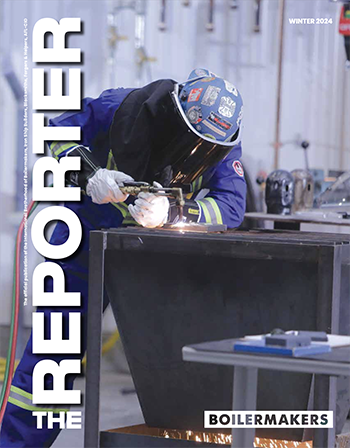A special report from Abe Breehey
Assistant Director for Government Affairs
BALI, INDONESIA, DECEMBER 2007 — How important is the issue of climate change to the International Brotherhood of Boilermakers? Well, let’s just say that no other issue would have pulled International Vice President Sam May away from South Pittsburg, Tenn., on the eve of the high school football state championship. But IVP May joined me and three other Boilermakers to participate in the climate change meetings taking place in Bali. [International Vice Presidents Larry McManamon (Great Lakes) and Warren Fairley (Industrial Sector), and Director of Communication Donald Caswell also attended.] We are proud to join with trade unionists from around the world and add our voice to the International Trade Union Confederation (ITUC).
Members of the International Executive Council recognize that we must be active participants in developing a fair global framework to address climate change. For the past century, our craft has been involved in constructing infrastructure we now know has contributed substantially to the greenhouse gas emissions that are causing climate change. For the next century, our craft will be essential to deploying the new technology now available to reduce the carbon emissions associated with energy generation and industrial processes.
The carbon footprint of the United States and other developed nations has been a major cause of global warming. However, evidence indicates China surpassed the United States as the leading source of greenhouse gas emissions earlier this year. Effective mitigation action must include the involvement of all major emitters, so many of us from the United States decided to attend a side event related to China, India, and Brazil.
Effective global action will require investments far beyond the paltry sums dedicated to climate change mitigation thus far. Both China and India continue to invest in power generation technology that is dirty, inefficient, and decades old simply because it’s the cheapest option available. Unprecedented levels of international investment will be required to expand the new, more efficient energy technology around the world. The technology is available now, but its development and deployment needs to be accelerated, and that requires investment — both public and private. The union movement must do more to push our governments and private industries to make it happen, and America must lead the effort. Half-measures simply won’t cut it. The choice is abundantly clear: Pay now, or we will indeed pay quite dearly later.
Even on an international stage, the old adage holds true: All politics is local. It’s nearly certain the breakthroughs necessary for U.S. participation in the next round of global commitments won’t happen. However, it is highly likely that Congress will enact a domestic greenhouse gas reduction program soon. So, it made the most sense for many of us from the United States to attend the afternoon side event hosted by Environment Defense regarding the Lieberman-Warner Climate Security Act, featuring the staff from the offices of Senators Joe Lieberman, John Warner, Tom Carper, Larry Craig, and Representatives Henry Waxman and James Sensenbrenner.
For a few hours, the conference room at the Grand Hyatt Bali looked more like the Russell Senate Office Building, as representatives from a wide range of U.S. stakeholders gathered to hear from the assembled congressional staffers. The union movement was well represented, as two of the half-dozen or so questions fielded by the panel came from our delegation. But the world is indeed watching, and the international participants in attendance were anxious to get some answers to the million-dollar question: What exactly is the United States going to do about this?
One issue that received significant attention and is a key priority of the labor movement is a provision in the Lieberman-Warner bill borrowed from New Mexico Democratic Sen. Jeff Bingaman’s legislation endorsed by the AFL-CIO and some affiliate unions. This provision would require that once a domestic program is in place, importers of carbon-intensive goods from any major emitting nation that has not taken comparable action must hold “carbon allowances” to cover the emissions related to their production. The goal is to prevent so-called “leakage” of carbon emissions — taking U.S. jobs to foreign countries with lower manufacturing cost because they haven’t done their part to limit greenhouse gas emissions. That other nation likely already enjoys a significant trade advantage over our nation because it is an egregious worker’s rights violator and manipulates its currency. David Macintosh, on Sen. Lieberman’s staff, deserves credit for his defense of this provision in response to a question suggesting it is merely U.S. “protectionism.”





